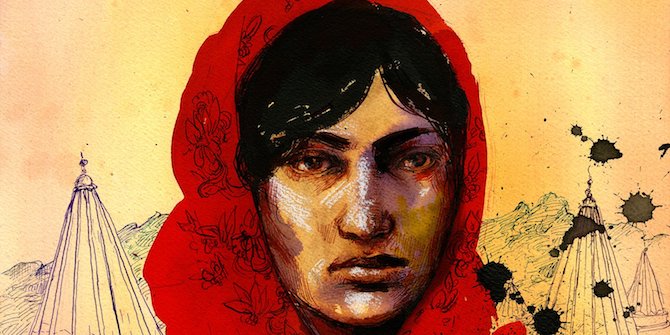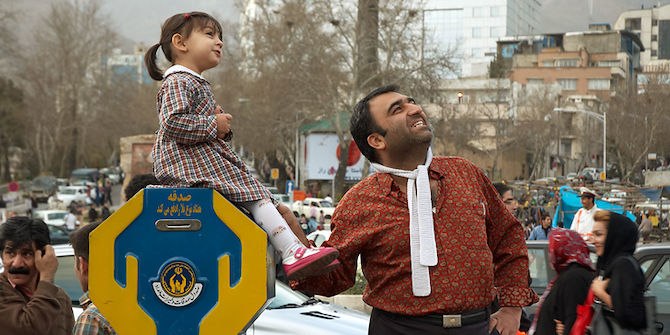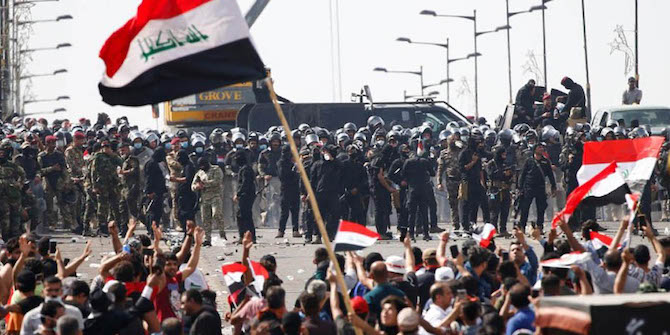by Andrea Malouf

Over the past two years Iraq’s Prime Minister, surrounded by some credible technocrats, has managed to balance delicate political dynamics in a time of war and keep at bay overwhelming economic, social and political pressures. But as elections draw near the concept of Iraq as both, a state and a geographical expression, will be tested.
Iraq the Republic is woven together by a loose, interrelated, triad of power politics and tribal alliances, the act of government: administration and service provision, and local memories, narratives and opinions. Taking each aspect in turn, the State creaks under significant strains.
Power Politics
Iraq, governed by an internationally-recognised authority, implies, or even requires, in the modern conception of a State, a centre of gravity: power and authority. But power in the country is diffuse, with multiple competing political and geographic centres, which unite rarely and only in time of crisis. The political status quo in Iraq was maintained – and Da’esh defeated – not due to the strength of the State, but due to the strength of tribal, economic and other ties that enabled networks to mobilise quickly into organised fighting forces sanctioned through Ayatollah Sistani’s Fatwa by religious authority. With the Da’esh threat now defeated, renewed fission amongst these tribal segments and alliances is a matter of time. This would not be a change, but a return to the status quo of power politics in Iraq where entropy reigns supreme.
Administration and Power
Abadi’s administration has repeatedly stated its commitment to the decentralisation agenda under law 21 which, in non-Kurdish territories, devolves the power of now seven ministries to the provinces. Implementation of this law is, however, stymied by several factors, chiefly, a lack of political consensus on how the law is to be administered. (In general, one could take the view that any political centre does not want the provinces to work. A power vacuum at a provincial level enables centres to control budgets and influence provincial politics more easily than would be the case with a functioning decentralised system.)
Practically, Abadi is balancing the need to have a strong federal government, with the complexity of running a fragmented state. The government continues to push for decentralised administration to relieve itself of the political implications of maladministration. But where power goes, administration follows, and the current government lacks material political and administrative power. This mixed devolution creates confusion which exacerbates the low administrative capacity, corruption and maladministration in the provinces.
Attempts to decentralise authority to devolve blame risks exacerbating conflict between federal government and the province. This is evident form recent events in Basra where the federal government has decided to withhold further funds until such a time that the province pays off its debts and brings its budget under control. As a result, provincial activity has stopped. Even though Basrawis experience corruption and see resource waste in the province, they benefit more directly from patronage networks at a provincial level than form federal government, and therefore direct popular anger and blame at the federal government, further eroding their trust in this authority.
In Ninewah, decentralisation has been paused but the core function of government after security—service provision—has instead been outsourced; donors must now be conscious of how service delivery through their institutions aids or inhibits recovery and development of government capacity. In the short term, their support responds to pressing need, but through providing services for the state, donors risk muddying the water, filling the competence gap left by the centre and the provinces, and removing the incentive for central government to improve governance and deliver effectively. The state suffers most when this support ends, as evident from previous chapters of Iraq’s recent history.
Local memories, narratives and views
For citizens of Iraq, any interaction with their government – central or provincial – is defined by two themes: corruption and lethargy. The administration is slow, weak, confusing, inconsistent, and the public pays double for the privilege. As in the case of Basra above, there exists low trust in provincial government, but blame is directed at distant federal government, with an instinctive aversion to any attempts at reform.
Narratives now pull the country in two dangerously different directions. In southern Iraq, tribe-based networks have been militarised and these bonds now strengthened in blood. Streets are lined with images of those martyred fighting Da’esh and loyalty is local. Public resentment of central government and Abadi is great, with a common refrain that the government is deliberately depriving countrymen of revenue from imports and oil, is trying to raise electricity prices through privatisation, and is diverting all resources to an ‘undeserving’ Sunni North-East.
In Northern Iraq, there is a palpable reaction by youth against the tribal system, on the basis that this had been manipulated against its supposed beneficiaries. There is hope that Abadi and central government can bring stability, deliver services and compel provincial government to change. This sentiment is clear even in communities such as Tel Keif which have experienced significant social turmoil. Communities may well be war wearied, but they see themselves being pulled in that direction by the powers that be: the old political class who benefits from the war economy. The weakened Sunni political class perceived to be less legitimate amongst its people had initially lobbied to delay elections for fear of losing out, but will likely rally to protect its interests and patronage networks.
How will these forces pull?
Over the past three years the future of Iraq as a geographical expression looked bleak. Despite the diverse nature of the fighting forces, it was the centre that pulled the country back together through its ability to navigate delicate power dynamics and leverage broad-ranging international support from unlikely indirect allies, specifically Iran and the United States, who were fighting on the same side (though not together), for some shared objectives.
As elections draw near, people, power and politics are set to collide, with the Hashd, Peshmerga, tribal, provincial and federal structures, old and new religious and political authorities, all vying to control narratives, geographic and political ground. International interests pulling parties in different directions, and the decoupling of parliamentary and provincial elections will exacerbate tensions: for those who don’t make it into parliament, the stakes are high as they vie to secure a seat in the province.
In the short term, several questions remain hanging, the answers to which will seal the fate of Iraq as a State. The extent to which Southern politicians play off mistrust and anger to increase their vote share; how the Hashd will mobilise to vote; and, whether the State will be able to withstand the pre-election political fission and resultant popular anger, all remain to be seen.
After elections, the government either successfully asserts authority, equitably distributes resources and rebuilds trust within and between communities, or international actors must be prepared to manage the country’s fragmentation (particularly as a power vacuum in the territories could lead to a Sunni nationalist and secessionist narrative re-emerging). Though power in Iraq may well be diffuse and negotiated, that does not mean there cannot be any kind of leadership. In the long run, however, strong leadership is along insufficient. Social and political change will be necessary for the state to survive, but history shows this change to be rarely incremental: a meaningful break from stasis usually only happens under pressure or renewed crisis.
This is an abridged version of a paper given at a workshop on Iraq and its Regions: Baghdad–Provincial Relations After Mosul and Kirkuk, held at the LSE on 15 January 2018. See below for the full list of papers.
In this series:
- Introduction by Toby Dodge
- Iraqi Politics: From Sectarianism to Nationalism by Raad Alkadiri
- ‘Functioning Federalism’ in Iraq: A Critical Perspective by Ali Al-Mawlawi
- Security in Iraq: From Cooperation to Confrontation by Michael Stephens
- The Popular Mobilisation Forces and the Balancing of Formal and Informal Power by Renad Mansour
- Peshmerga Unification in Jeopardy by Fazel Hawramy
- Baghdad and Erbil and the Path Forward: The Wisdom of Hitting the Reset Button by Akeel Abbas
- Assessing the post-referendum crisis between Erbil and Baghdad by Zeynep N. Kaya






